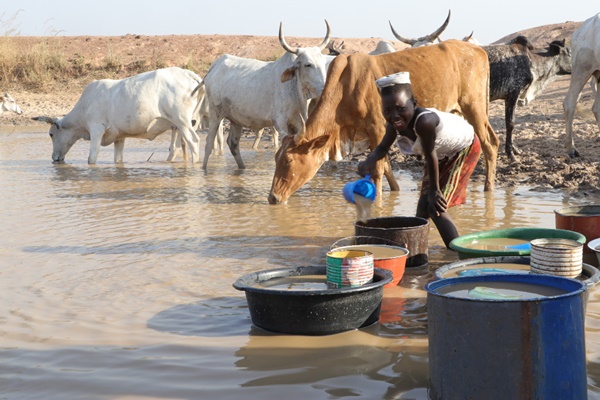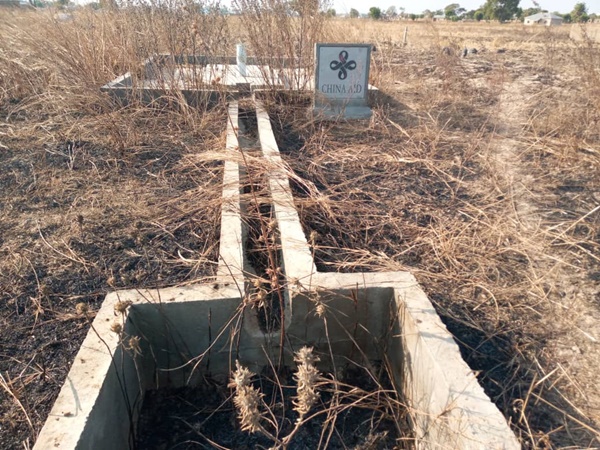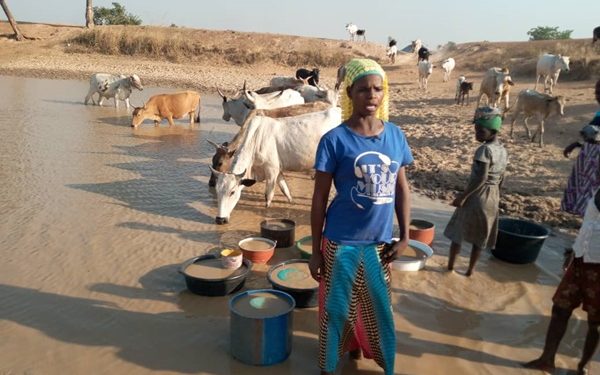For many communities in the north of Ghana, the dry season means more struggles for quality water.
“This is not new to us because every year around this time, we have to go through it”, says Yaw Elisha, a resident of Nyeshie.
With a yellow gallon in hand, Yaw walks down a one and half kilometre distance to the only dam that still contains “what he calls water” to use at home.
“We suffer a lot in this community. We don’t have taps. We only have three pipes here serving the people. They open the pipes for one day in a week. We only drink from the dam. Sometimes we apply alum and that is it”, Yaw says.
Tropical and Sahel regions of West Africa, including Northern Ghana, are experiencing the dry season and this means many communities have been ushered into a season marked by the long search for water and thirst. The situation is worse for areas that have not been connected to pipe-borne water.
Nyeshie and Damakon-Yeli communities are currently facing acute water shortages that are likely to wreak havoc on the residents due to the onset of the dry season in the North of Ghana. These two communities are among Tamale’s emerging settlements (unplanned areas) off the Airport road, but access to clean water remains an uphill challenge. “The dam is even drying up and we are more scared”, says Yaw Elisha.
More than 2,000 households live on this stretch, and their sources of water are the dams because the taps are not connected to their homes except a few communal ones which together are inadequate for the people.
Umar Mohammed, another resident who feels the impact of the lack of good water in his community says the authority is refusing to provide solutions for them.
“How can only three pipes serve the whole community? Look at the population. And the dam too needs to dredged but nothing is being done about it. Not that we have not complained to them, they just refused work on it.”
Humans competing with animals
“We drink this water together with the animals like that,” says Afishetu Dauda. The housewife was at the dam side fetching the polluted water when Citi News got there. She had to wait for the cattle to take their turn in drinking and left before she fetched.
Afishetu explains that though she knows the water is unsafe, there is no choice for her. “we fall sick very often drinking the bad water. Is it right to share the same water with animals? We have aged people at home and their health is in a bad state because of this water they drink.”
According to UNICEF and the World Health Organisation (WHO), an estimated 5 million Ghanaians rely on surface water to meet their daily water needs, leaving them vulnerable to water-related diseases. Further to this, some 81 percent of Ghanaians lack access to improved sanitation.
In 2010, the United Nations general assembly declared that human right to water entitles everyone to sufficient, safe, acceptable, physically accessible and affordable water for personal and domestic use. It further enjoins governments around the world to ensure that people can enjoy clean, available, acceptable, accessible, and affordable water and sanitation. But that declaration is yet to be implemented in communities around the northern region as they have just been ushered into long dry and thirsty days once again.
School children are also reeling under the water shortage. Fuseini Fauzia, a student says the absence of good water makes her miss school always.
“They said we should come to school early but when daybreak, due to long search for water, we often go late and the teachers beat us for coming late. There are days you have to miss school because of water. When you bath this water, because of the high concentration of clay, it makes your body white and people mock you that you don’t bath.”

Treating water alum and associated risks
Citi News can independently report that the water at the dam looks polluted, milky and muddied due to constant interference by animals. As a result, alum is widely used by the residents as treatment format for the water before using it. But that is allegedly causing health challenges to the people as Rasheeda Abibu explains.
“When we apply the alum and drink, we fall sick. Some get diarrhoea others get different diseases. Children are rushed to the hospital every day because of the alum. So, we just decided to be drinking it like that.”
Yaw Zong, another resident whose daughter just recovered from severe diarrhoea suspected to have been triggered after she drunk water treated with alum says even when they bath with such water, it sticks on their skins and doesn’t taste like water when one drinks it.
Using alum alone to treat water has been criticized by experts not to be the best because alum only allows particles and sediments to be separated from the water and does not clean the water from any dirt. Alum is said to be one of seven steps to treating water.
Homes not connected to taps
Women queue at midnights for water at days that the taps flow. Only three public taps are serving the neighbourhood but only for those that can afford to pay says Sanatu Abukari.
“Buying the water all the time is not easy. Some people come to buy on credit and have not been able to pay back. A home with many people cannot use one barrel. They have to fetch up to 15 barrels and if you buy a barrel for 20 pesewas for the 15, that is 3 cedis.”
“Calculate that for 3 days and see if that is a small thing. So, once you can’t pay for that next time you won’t be allowed to fetch from here until you pay the debt. It doesn’t look as if we are also in the city. Look at Tamale and here, but we suffer for basic things. No market, no water”, she concludes.
Experts say, those living in poverty often pay up to ten times more per litre for water service from private vendors than their middle-class counterparts connected to pipe-borne water. These water costs can be reduced through investments in improved household water assets such as connections, rainwater harvesting equipment, and wells.

Blame on political leadership
Unfortunately, the local assembly and the government is not paying much attention to people’s concerns.
Kande Alhassan is fed up advocating for clean water in her community. “We are tired of complaining to the assembly about this problem. Even if we can’t get pipe water, the dam should be dredged to sustain us. if not, no one in this community is going to vote this year.”
With the 2020 polls in sight, the water crisis is further charging the political atmosphere, attracting massive public attention which has the tendencies of influencing rural electorates.
Two mechanized boreholes that would have provided needed water for the residents are rotting away outskirt of the community. One is an abandoned Chinese government-funded borehole which started in 2016 but is yet to be completed.
The other has been left defunct and became a playfield for children at the expense of quality water.









